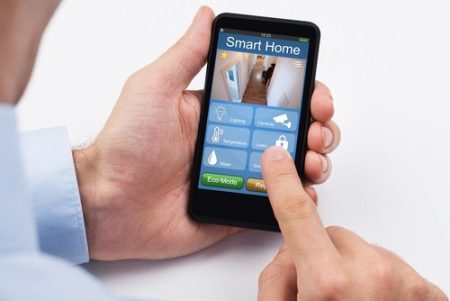January 12, 2018 – Welcome Jared Wade who previously has provided his insights on technologies that are changing the way we live and work. Wade has lived in Latin America where has covered business and sports. he has been an NBA columnist at FanSided; an editor at 8 Points, 9 Seconds; and a contributor at The City Paper Bogota. He continues to live in Colombia where he divides his focus between writing about the financial sector, and the ongoing peace process. You can follow him on Twitter @Jared_Wade. In today’s posting, he writes about four current technologies that will change how we manage our personal and home security. As always your comments are encouraged.
A New Year, a New You. That’s the motto for 2018, and everyone should be looking to make improvements. While health, relationship, and financial goals may come first, don’t forget about upgrades you can make to your personal and home security. These days, everyone is so connected to their smartphones and computers, that it only makes sense to ensure all aspects of your life, real world and digital, are protected. With that in mind, here are four worthwhile technology upgrades from which everyone can benefit in 2018.
1. Smart Smoke Detector
Until recently, the only enhancement that smoke detectors have seen in decades is the added function that makes it beep incessantly when the battery is dead. But now, the technology has made a light-speed jump into the future and for good reason.
While many other security gadgets receive more hype, simply buying a smart smoke detector, including those sold by Nest Protect, is a relatively cheap way to protect your family against one of life’s biggest tragedies. And it’s simple. If the device ever senses smoke, fire, or dangerous carbon monoxide levels, it doesn’t just blare a horn; rather, it sends a real-time notification to the homeowners’ smartphone or anyone else tied to the app. This way, a parent, even one located hundreds of kilometers from home, can know instantly if there is a problem in their house. Setup and installation is a breeze since the device is intended to be easy to use by even those with little digital know-how.
2. Ransomware Protection
Last year a global WannaCry ransomware attack served as a wakeup call for the cyber-security world. Indeed, it was further evidence that the technology industry, and society at large, had not taken previous incidents seriously. Case in point: In 2013, the CryptoLocker attack saw criminals demand money in return for releasing control of valuable data they had taken from computers and servers.
Now, there’s no denying it. Malicious ransomware attacks have become a threat to all desktop computers, laptops, servers and more. For this reason, ransomware protection software is now something all companies and digital users should consider as a second line of defense.
On top of peace of mind, the best-in-class solutions offer the ability to maintain prior versions of files, allowing users to restore uncorrupted backups should an attack occur. This type of protection can save anyone from the financial fallout of having to negotiate with hackers.
3. Digital Door Security
Adding some digital protection to your home or company’s entryway is another peace-of-mind improvement that brings immediate benefits in terms of security and accessibility.
For example, the voice activation and Alexa/Apple Home Kit integration of the August Smart Lock Pro + Connect is a bit more robust (and expensive), while the Kwikset Kevo Smart Lock is among the best no-frills, affordable options to keep out unwanted guests.
On top of all this, smart locks add convenience. Depending upon the model, users aren’t susceptible to losing any physical keys. Instead, they receive a biometric code, digital key or app-based method to open the front door.
4. Smartphone Antivirus Software
The bulk of malware targeting mobile users is aimed at exploiting Android, the most popular operating system in the world. This is the reason that most security experts recommend investing in some sort of anti-virus protection. And there are several good options available to choose from.
Avast is among the biggest names in anti-virus software security. Users can download it for free or pay a premium that costs a few dollars and lets you shut off the application’s ads. Avast puts up a strong firewall and ensures that, among other safeguards, malware can never launch any sensitive apps.
Meantime, McAfee has brand recognition and includes the benefit of being a familiar virus-scan interface for many users.
And Antiy AVL is a popular choice that has the acclaimed the prestige of having won the AV-Test award for top mobile-device protections.
Ultimately, no matter which option you choose, the key is to start prioritizing upgrades to your security. These days, with all the opportunities out there to harden your digital life, everyone should be working to ensure they don’t become its next victim.









